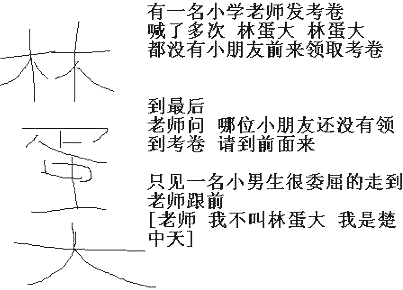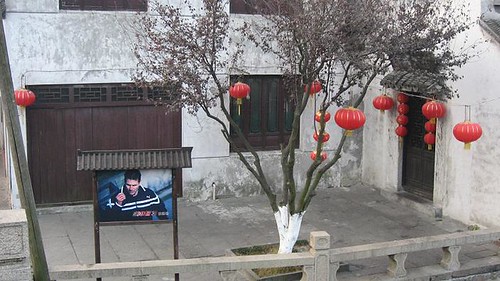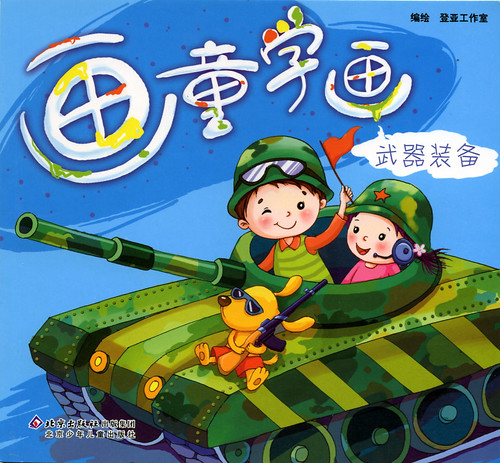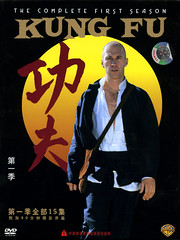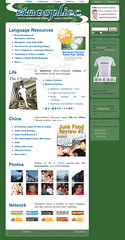06
Dec 2006The Humor Vacuum Sucks
TalkTalkChina is gone, and there’s a bit of a humor vacuum in the China blogosphere. Who’s going to help fill it?
– Greg of Sinobling is writing again. His new post entitled So What You’re Saying is You Don’t Have a Liver for Me is hilarious.
– The TTC heir apparent seems to be Sinocidal. The similarities are many, but I haven’t seen anything quite on par with TTC’s greatest hits. The Flopsy entry got my attention, though.
– Yellow Wings apparently has some kind of relationship with Sinocidal. The entry entitled How to write a China-related weblog was amusing, but I just couldn’t figure out which type of weblog to identify with… hmmm.
The last two are rather recent additions to the China Blog List. Since good China humor seems to seethe with negativity by default, I’ll balance it out a bit by finishing with a link to 10 reasons why living in China is great from another new one called Positive Solutions. But it’s not funny. Oops.
04
Dec 2006Alf, Lord of the Dolphins
Have you heard of the Chinese river dolphin? The Guardian recently wrote a story called
On the trail of the Yangtze’s lost dolphin. By “lost” they mean “likely already polluted into extinction.” (Whoops… who could have predicted what whacky side effects repeated dumping of untreated chemical byproducts into a river could have?)
The species may already be long gone, but that hasn’t stopped an international expedition from getting out there and trying to find it. My friend Alf actually joined said quest. It is as yet unclear whether their efforts are all in vain.
Alf, at least, got himself featured in the Guardian. Check out image 04 of the slideshow and you can see him peering through a pair of comically large binoculars. (Ladies, check out image 14 to see a Chinese fisherman with a physique rivaling Bruce Lee’s!)
Thanks to Heather for the links.
02
Dec 2006Lin Danda
Commenter Marco e-mailed me this great visual Chinese joke (translation and explanation follows):
Translation of the joke (and you do need the visual above to understand it):
> A primary school teacher was returning test papers. She called out again and again, “Lin Danda! Lin Danda!” But none of the children came forward to collect the test paper.
> Finally, the teacher asked, “is there anyone that hasn’t gotten a test paper back? Please come to the front.”
> One little boy unhappily approached the teacher at the front of the classroom. He said to her, “Teacher, my name isn’t Lin Danda. I’m Chu Zhongtian.”
Sorry, if you can’t read the Chinese characters, there’s nothing to get. For those that want the explanation, read on.
30
Nov 2006Wrong Gong
As I’ve mentioned before, I’m sort of married. I see it as a year-long process beginning with a legal marriage and ending with a religious and social ceremony. Between point A and point B, however, is the acquisition of a new residence. Perhaps more significant is the subsequent decoration of said residence. This has been keeping us quite busy for the past month.
In China if you buy a new apartment (OK, I know it’s not really an “apartment” if you “buy” it, but this is what I say), it comes as an empty concrete shell. No drywall, no internal wiring or plumbing, no nothing. This condition is known as 毛坯. Starting from such a husk is a lot of work, because you have to design everything (or hire a designer), and you have to hire a contractor to get all the labor done. It also brings a lot of freedom, though, because you’re literally free to do anything with your apartment, short of knocking down key structural walls or tearing out the building’s shared plumbing or wiring.
So my wife has a pretty cool vision for our new apartment. It’s sort of an adapted “Mediterranean” design. That means it incorporates arches in some places. There are many things my Chinese is not yet good enough for, and architecture is certainly pushing it.
It appears that in Chinese, an arch shape is usually referred to as a gongxing, a word that, until recently, I was unfamiliar with. When I hear a new Chinese word, lots of things happen in my mind:
1. My brain checks it against all the vocabulary I know or might have once known
2. My brain factors in the possibility of southern-accented Mandarin distorting a word I know in proper Mandarin
3. I analyze and note the tones
4. Given the context and my understanding of the meaning of the word, I try to mentally match the syllables with appropriate Chinese characters I know
In this case, checks #1 and #2 were not helpful. When I got to step #3 I focused on the fact that xing was definitely second tone, so must be 形, meaning “shape.” It just made too much sense to be wrong. Without paying much attention to the tone of the gong syllable, I moved on to step #4. I decided that what made the most sense was the character 弓, meaning “bow.” In this way I concluded that the word we were using for “arch shape” was 弓形 (tones: 1-2).
It was a reasonable guess. 弓形 is, in fact, a word. According to Wenlin, it has the (very logical) meaning of “bow-shape” and “curve.” In math it can also mean “segment of a circle.”
I got away with saying gōngxíng (tones: 1-2) for a while, and somehow remained blithely unaware that everyone around me was saying it slightly differently. My wife is not my Chinese teacher and really never has been, so she rarely corrects me. She corrects me when my mistake is so blatant that it pisses her off, or if it’s a chronic error that eventually gets under her skin. Such was the case with my “gōngxíng.”
“It’s gǒngxíng,” she told me finally. “Gǒngxíng!” (tones: 3-2).
I looked it up later. The dictionary showed me 弓形. And it showed me 拱形, meaning “arch.” An architectural term.
It’s little incidents like this which firmly cement a word in one’s memory.
28
Nov 2006Rock, Paper, Scissors: the Store!
Over the weekend I noticed this home decor store:
The name is 剪刀·石头·布, which translates literally as “Scissors · Stone · Cloth” and more colloquially as “Rock, Paper, Scissors!” Cool name.
I must take issue with the logo, however. It depicts two hands, which appear to be in scissor and (very weak) paper mode. Where’s the rock? It’s the best! To quote Bart Simpson, “Good ol’ rock. Nothing beats rock.”
Furthermore, there are hearts on the hands in the logo. Hearts? Come on. This shows a profound misunderstanding of the game (or perhaps an underlying cultural rift?). I mean, RPS is an international “sport” with a very competitive annual competition. It’s not about “love,” it’s about all-out psychological warfare. You gotta know your gambits. You gotta know your strategy, because “the game itself is as complex as the mind of your opponent.” The ignorance implicit in the above logo sickens me.
But speaking of crappy logos, the logo on the World RPS Society website is not. The crest on the left is not so noteworthy, but the graphic to the right is at once a nod to early Communist area dynamism as well as to Fountainhead cover graphic sensibilities. I like.
In conclusion: 剪刀·石头·布, your logo sucks, but your heart is in the right place. Rock on.
27
Nov 2006八荣八耻
人家发给我的短信:
> 《八荣八耻》
以关心老婆为荣
以忽视老婆为耻
以伺候老婆为荣
以麻烦老婆为耻
以赞美老婆为荣
以批评老婆为耻
以抢干家务为荣
以好逸恶劳为耻
以下班回家为荣
以夜不归宿为耻
以诚实专一为荣
以拈花惹草为耻
以遵守家法为荣
以违法乱纪为耻
以上缴工资为荣
以窝藏奖金为耻
我发出的短信:
> 《八荣八耻》
以关心老公为荣
以忽视老公为耻
以伺候老公为荣
以麻烦老公为耻
以赞美老公为荣
以批评老公为耻
以抢干家务为荣
以好逸恶劳为耻
以下班回家为荣
以夜不归宿为耻
以诚实专一为荣
以招蜂引蝶为耻
以服从老公为荣
以违法乱纪为耻
以上缴工资为荣
以疯狂购物为耻
26
Nov 2006Ziboy in the Flesh
Last Monday I had the pleasure of meeting Wen Ling (温凌) of Ziboy.com in the flesh. Although I interviewed him once upon a time, we hadn’t communicated much since then. I was happy, then, to get an e-mail from him out of the blue saying he was going to be in town and did I want to meet up.
I was hoping that he was going to show up with a camera around his neck, because the only angle I could possibly recognize Wen Ling from would be the absolute profile shot. (He never posts any other photos of himself.) He didn’t show up with his camera out–and in fact I never even saw his camera–but he had no trouble identifying me.
Talking with Wen Ling, I found out he has a personal connection to Shanghai. He thinks of himself as a Beijinger, but he actually spent some of his early years in Shanghai, his mother’s hometown. He even understands quite a bit of Shanghainese. Still, he wouldn’t want to live here. Beijing is his home.
There was one point in our conversation which, to me, made Wen Ling feel distinctly non-Shanghainese in his outlook. He told me he no longer works as a photojournalist, even though it paid well and he really enjoyed it. He quit the job because what he wanted most was to pursue his art. As a photojournalist, he simply never had time for it.
I know this type of person exists in Shanghai too, but they seem so marginalized here. Somehow in Beijing pursuing art is just natural…
23
Nov 2006Japanese Thanksgiving
Today was Thanksgiving. In years past I’ve gone to a lot of trouble to get a bunch of friends together at a restaurant serving an American Thanksgiving meal. It’s always overpriced, but it’s always good, and I like the Thanksgiving dinner enough that having it only once a year is woefully inadequate.
This year, though, I didn’t bother. Work is busy, and I just didn’t feel like calling all the nice hotels in Shanghai and being told of 300 or 400 rmb meals.
So instead, I got together with some friends and we did Japanese all you can eat. Despite rumors of “turkey sashimi” there was not a scrap of real Thanksgiving food to be found. I didn’t even stuff myself as much as I could have.
It’s always good to get together with a large group of friends (we don’t do it enough), but it’s getting harder and harder to “fake” Thanksgiving. I think I might just start holding off on the Thanksgiving festivities until my visits home to the States.
21
Nov 2006Tom Cruise Lingers on in China
I visited Xitang in 2002. It was a little less famous then; it hadn’t even started charging admission for entrance through its gates. It was just one of many charming little water towns in Zhejiang Province, but it especially appealed to foreign and domestic tourists. The town was more than happy to accept the increasing tourism.
When Tom Cruise came to China to film Mission Impossible 3, part of the movie was filmed in Xitang. Xitang closed down for the filming. It had hit the big time.
One of my co-workers visited Xitang recently. He said its rustic charm is now “enhanced” by the posters of Tom Cruise everywhere. Curious, I had to do a search. This is what I found:
So now Xitang is “that little water town with pictures of Tom Cruise all over it.” This doesn’t bother me; it just amuses me somewhat. Things change, but everyone still just wants to make a buck.
19
Nov 2006Taiwanese Cuisine: Overrated?
Prince Roy in Taiwan:
> I consider it one of my biggest tasks to dispel the myth that Chinese food in Taiwan is ‘the best in the world’. It is one that many foreigners living in Taiwan buy into uncritically. For instance, in the No. 5 issue of Taiwanease, Albert Creak, author of the article “In Search of the Pu Pu Platter”, enthusiastically agrees with a guy named Mr. Lin who tells him: “Once you’ve tried the Chinese food in Taiwan, you’ll never want to eat at another American Chinese restaurant again.” Not only does this perpetuate a harmful vicious cycle which overrates the quality of Chinese food in Taiwan, it is woefully and demonstrably inaccurate. It’s high time we take off the blinders and face the truth: yes, Chinese food is good here, but it’s no great shakes, especially compared with the PRC, and it now lags behind the USA as well.
> I couldn’t have made this argument thirty or even twenty years ago, but the simple fact is that time has marched on and left the culinary world of Taiwan behind….
I’m not much of a gourmet. The problem is I tend to like most things I eat. I’m just not critical enough. The way I see it this works out in my favor in the long run, but it’s a reason I don’t normally shout my opinions on food from the rooftops. It’s interesting then, to see Prince Roy’s take. When I was in Taiwan I found the food good, but not amazingly good. The scene seemed similar to Shanghai’s: plenty of mediocre offerings, but also plenty of great food if you can afford it and know where to go.
18
Nov 2006So True
Meg at Violet Eclipse says:
> China is so safe, a girl could walk alone at night without worrying she’d be attacked or robbed. China is so dangerous, she might fall into a gaping hole in the middle of the sidewalk, left but the constant construction.
> Chinese people are the hardest-working people I’ve ever seen. People like Juice Aunt and her husband are outside with their cart, all day, every day, no matter what the weather is. But Chinese people are the laziest people I’ve ever seen. I’ve gone into restaurants and seen the staff asleep on the dining tables.
Read the whole entry.
17
Nov 2006Audio Resources for Advanced Chinese
I’d like to call attention to some work being done at ChinesePod, not because I work for ChinesePod, but because I think we’re doing good work for a specific learner demographic that is all too often neglected. Still, it seems like ChinesePod Advanced (高级版本) is not well known. For as much work as we’re putting into it, it deserves a little more attention.
15
Nov 2006Military Weaponry for Kids
Identify the theme that doesn’t belong in a series of books for Chinese children:
1. Cartoon Characters
2. Cute Animals
3. Mysterious Dinosaurs
4. Pretty Flowers
5. Means of Transportation
6. Military Weaponry
If you guessed #4, “Pretty Flowers,” you are right! The other five are themes of real coloring/drawing/character practice books in a series by Beijing Children and Juvenile Publishing House.
While we’re on the topic of Military Weaponry for Kids, let’s explore that book, shall we? Here’s what the book’s cover looks like:
The big name on the front is 画童学画, which could be cleverly “translated” as “Draw Child Study Draw.” Here’s what a few of the pages look like:
Each page basically does three things: (1) teaches the kid how to draw something across the top, (2) using pinyin, teaches the kid how to say the name of the object in the middle, and (3) gives the kid practice writing the character at the bottom.
Some observations:
1. The characters offered for writing practice in the book are at a kindergarten level, but the weaponry vocabulary is at a much, much higher level. (I don’t even know the names of some of those guns in English. Clearly I come from a totally un-war-like culture. Ahem.)
2. The part at the top that “teaches drawing” isn’t helpful. I used plenty of those “learn how to draw” books growing up, and this one just sucks.
3. Hey, this book is pretty useful for someone like me to learn weaponry vocab. Among the Chinese vocabulary taught in the book are: machine gun, heavy machine gun, handgun, rifle, semi-automatic rifle, uzi, revolver, hand grenade, flame thrower, rocket launcher, smoke grenades, tank, aircraft carrier, bomber plane, fighter jet, guided missile, stealth bomber… and more.
4. One of the guns is called a 来福枪 (lit. “come luck gun”). Hehe. Wenlin says it means “rifle” (a kind of transliteration) but it looks more like a shotgun to me.
5. Oh, right, I almost forgot: why do little Chinese kids need to be learning this stuff??
This kind of children’s book is not very uncommon; you can find similar books in almost any bookstore in China. (See the book here.)
Sort of related: see also Peer-See’s highly amusing entry on teaching incomprehensible weirdness to the children through bizarre blocks.
13
Nov 2006Kung Fu, Season 1, on DVD
Today while grocery shopping at Carrefour I discovered a rather extensive collection of non-pirated DVDs. It was really kind of shocking. I’m not talking about just Roman Holiday or Charlie Chaplin or whatever; I’m talking about movies that were in theatres in the States in the past year. Most were priced at about 20 RMB. While that’s still close to triple the pirated price tag, it’s moving into the affordable range. With DVDs priced at 20 RMB, many Shanghai consumers could still afford them (although they might have to get choosier) if the police were ever to really crack down on DVD piracy instead of just pretending to.
But anyway… this post is about the old TV series with David Carradine, Kung Fu (Chinese title 功夫, not to be confused with the Stephen Chow movie of the same name). I found Season 1 on DVD at Carrefour priced at 118 RMB for the 6-disc set. Anti-piracy saint that I am, I plunked down all that cash for the official version.
When I think about it, the TV show Kung Fu was probably my first exposure to “Chinese culture” growing up, aside from the occasional Chinese restaurant. I was never very interested in China until about two years before coming here, so it’s kind of interesting to revisit one of my earliest sources of Chinese cultural input to see what I think of it now. I remember watching bits of the TV show with my dad as a child and finding it pretty boring. So now, about 20 years later, I have a chance to see what I missed.
I was also curious what Chinese people think of this TV show… I mean, it’s a story about a Shaolin monk in the American Old West, but it was written in the 70’s, mainly by Americans Howard Friedlander and Ed Spielman. I’m just going to take a wild guess here and say that they’re probably not eminent sinologists. The chances of massive cultural gaffes are great. You have tons of flashback scenes of the young protagonist at Shaolin Temple, and you can’t watch 5 minutes without someone spouting some sort of Eastern philosophy. Bruce Lee was co-creator, though, so maybe he made sure they got it mostly right?
Not being a journalist, I’m not bound to do any real research about this kind of thing, so I simply asked Xiao Wang (my ayi). She was very familiar with the show, and though it was great. Well, cool… at least some Chinese like it. She didn’t erupt into spontaneous laughter, anyway.
Three little details I noticed after watching the first episode:
1. The main character of the showed is called Caine. His name is written in the Chinese subtitles as 凯恩. This is also the Chinese name of Ken Carroll, co-founder of ChinesePod, as well as of his Kaien English School. Coincidence??
2. In one scene there are two clear references to Shaolin Temple as being in Hunan. But it’s not. It’s in Henan. The Chinese subtitles got it right.
3. Caine’s full name is Kwai Chang Caine. Apparently the Chinese translators couldn’t make any sense of that as a Chinese name, so they called him 凯恩· 张.
If you want English audio, the DVD won’t let you turn off the Chinese subtitles. It’s not a big deal except that I can’t help reading the subtitles. So I end up nitpicking the translation even though I don’t want to. On the plus side, though, I’ll learn how to say things like, “when you can take the pebble from my hand, it will be time for you to leave” in Chinese. And living in China, you know that’s going to come in handy.
UPDATE: Once upon a time, Prince Roy offered insight into the issue of Kwai Chang Caine’s real name and the location of Shaolin Temple.
12
Nov 2006Not Making You Think
WARNING: geeky tech/webdesign stuff ahead!
I haven’t been satisfied with the Sinosplice homepage for a while. I wasn’t sure what I wanted to do to make it better until I read Steve Krug’s Don’t Make Me Think, a manual of website usability. Yesterday I finally got some time to implement a few changes I’ve been wanting to make. Now there is a new homepage.
Old homepage design:
– Simple; almost all text
– Extensive use of RSS feeds to display latest content
– Javascript toggles to hide feeds and lists so that the page isn’t too long and cluttered with text
I think the problems are pretty apparent. It’s just so boring to look at. The javascript toggle just hid a deeper problem: too much info on the page. I’m guessing very few people ever clicked on the links to “open” the extra content for each section.
New homepage design:
– Tagline added (as recommended by DMMT)
– Graphical content teasers added (as recommended by DMMT), which rotate randomly on every page load
– Most feed-supplied content and many unessential links removed
It’s obviously just a lot more interesting to look at, and with the rotating graphics as well as the content from the blog RSS feed and the latest Flickr photos, seems a lot fresher. I still don’t have a concise welcome blurb, though. I also think there’s still too much text on the page. I’ll get to that stuff later.
Now that I’ve got the Tone Pair Drills done and the homepage redesigned, I’ll be spending more time on writing better blog entries (English and Chinese). I think it’s about time.
10
Nov 2006Medicine Ingredients = Pun Ingredients
Ever since I started doing my Chinese pun posts, I’ve been deluged with requests for more*. So today I am finally getting around to posting one that I’ve been seeing for something like a year in an ad on the subway:
> 药材好,药才好。
> Only good ingredients can make good medicine.
The pun is with the words 药 (medicine), 才 (an adverb meaning something like “only if”), and 药材 (medicinal ingredients). You have two three-character phrases with exactly the same character pronunciation, but the difference of one character in the two phrases (材 and 才, both read “cái”) gives the sentence clear meaning.
The two parts can’t be said to be entirely identical, because read naturally, there would definitely be different pauses in the first part and the second part. Still, the identical pronunciations still make it kind of charming.
* This is a total lie.
UPDATE: John B has provided a picture of the ad. Thanks, John B!
Related:
08
Nov 2006A New Advertising Low?
There are so many ads for cosmetic surgery in Shanghai taxis these days. Ken reports this grim discovery:
> Now, it can be annoying when you’re sitting in a taxi and you cannot turn off the TV screen 18 inches from your face, but I can live with it. However, what I saw in the taxi today today was perhaps a new low. There was a print ad, mounted on the back of the head rest in front of me, advertising a plastic surgery clinic that obviously churns out operations. Part of the ad was a reflective plastic thing (it looked like tin foil) in the shape of a mirror that invited you to look into it and consider if you didn’t need to do something about your looks. (I answered in the affirmative.)
> So there you are stuck in traffic, on a Monday morning for an hour and all you see is your own, crumpled, ugly mug looking back at you with, a doctor holding a scalpel smiling at you. (I wept profusely.) I almost told the taxi driver to head over to the clinic and get it done before lunch.
Yikes.
06
Nov 2006Busty Models Get Men Thinking… about what now?
If you’ve ever seen a “men’s magazine” like FHM or Maxim, you know that one of the main staples is “interviews” with buxom young females. In these multi-page features photographs figure prominently, words are squeezed in at the sides, and key quotations are carefully selected and displayed in big type next to the photographs. These quotations are usually sex-related, designed to get the reader’s pulse racing. (If you really need examples of this, you might try taking a look at NSFW-1 or NSFW-2.)
I haven’t really taken a look at the Chinese equivalents of these magazines, but I recently chanced upon the following picture of Chinese model 陈馨婷 (Chén Xīntíng):
The quote says:
> 我很期待穿婚纱的感觉。 (Wǒ hěn qīdài chuān hūnshā de gǎnjué.)
which might be (a bit awkwardly) translated as:
> I’m really looking forward to the feeling of wearing a wedding dress.
That funny feeling you’re left with is a special brand of men’s magazine culture shock. Maybe.
04
Nov 2006Business and Buddies in Beijing
Last Tuesday and Wednesday I was in Beijing on ChinesePod business. I can’t really talk about that, but hopefully our reasons for being there will all be public by the end of the month. This trip was significant for other reasons, though — I got to (briefly) experience Beijing as a non-tourist for once, and to finally meet some guys I’ve been communicated with over the internet for years (that’s hard to believe) without ever meeting.
The last time I was in Beijing was 2001. I visited twice that summer, once with my friend Ari as part of a big long trip, and the other time with my little sister. It had been 5 years since I saw it last, and with all the preparations for the Olympics, I was looking forward to seeing all the changes. I didn’t get to see any, though. My last visit to Beijing had been as a tourist, and this time I didn’t go to any of those same places. Geographically, the visits didn’t overlap a single bit. Even points of arrival and departure were different; this was my first time flying to and from Beijing. So without any physical overlap, I couldn’t really compare from a chronological perspective at all.
My impressions of Beijing were very good this time, though. The weather was great, and the areas of Beijing I spent time in were all pleasant. I think what impressed me most, though, was the laid back feel of the city. I know that Shanghai is extremely fast-paced and business-oriented, but perhaps I had thought Beijing was too, at least to a greater degree. To me, Beijing felt more comparable to Hangzhou in that respect. In Hangzhou, people go to West Lake to just sit around and play cards all day long. That kind of thing just doesn’t happen in Shanghai.
I met up with Roddy (Chinese Forums, Signese) first, and a little later Joel (Danwei) joined us at a cafe/bar on Houhai. Brendan (Bokane.org) organized a get-together at a bar called Sandglass (a very predictable selection, according to Roddy). There I met David (AdsoTrans) and Jeremy (Danwei, Danwei TV).
It’s always interesting to meet in person the people you only know through online communication. There were some differences between my expectations of these guys and what I actually experienced.
Roddy Flagg (Chinese Forums, Signese)
I have chatted with Roddy a lot over the years, and we’ve helped each other out with online projects more than once. I was already familiar with his sense of humor. Although I didn’t know exactly what he looked like before I met him, there weren’t any surprises there.
Joel Martinsen (Danwei)
Joel has been an extremely helpful commenter on Sinosplice over the years, and has helped me out with various translation issues. As any reader of Danwei knows, the man is an impressive translation powerhouse, and he’s an all around good guy as well. (He even bought me an ice cream.) No real surprises here.
Brendan O’Kane (Bokane.org)
I had actually met Brendan once before in Shanghai, but that time was brief and alcohol tinged. This time I got a better feel for the guy, and I think he’s pretty much exactly like his online persona with one big exception: he’s more cheerful in person.
David Lancashire (AdsoTrans)
What does one expect of a computational linguist who developed a free, impressive online machine translation system? A quiet, geeky guy, that’s what. I had chatted with David over IM multiple times, but I guess I didn’t get a good feel for his personality. In person he was funny and outgoing and didn’t look at all like what I expected. Also, he’s Canadian!
Jeremy Goldkorn (Danwei, Danwei TV)
I have a lot of respect for Jeremy, but somehow I got the impression of a rather formal, business-like person. Was I unfairly stereotyping budding media moguls? Anyway, Jeremy turned out to be a really funny, gregarious guy. It was really good of him to stop by after just getting back from a blogger conference in Hangzhou. I imagine he is quite bloggered out now.
Hopefully I’ll be making trips to Beijing more often in the future. Shanghai is the place for me for the foreseeable future, but Beijing is definitely a place I’d like to spend more time.


